2016英语六级语法复习:虚拟语气
- 格式:doc
- 大小:35.50 KB
- 文档页数:5
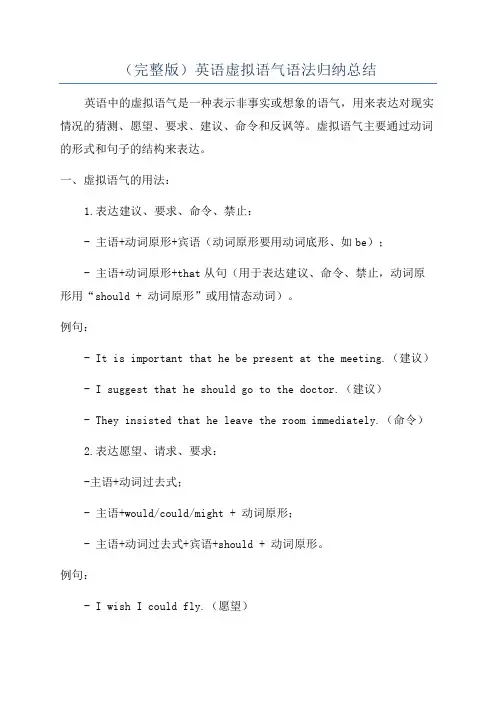
(完整版)英语虚拟语气语法归纳总结英语中的虚拟语气是一种表示非事实或想象的语气,用来表达对现实情况的猜测、愿望、要求、建议、命令和反讽等。
虚拟语气主要通过动词的形式和句子的结构来表达。
一、虚拟语气的用法:1.表达建议、要求、命令、禁止:- 主语+动词原形+宾语(动词原形要用动词底形、如be);- 主语+动词原形+that从句(用于表达建议、命令、禁止,动词原形用“should + 动词原形”或用情态动词)。
例句:- It is important that he be present at the meeting.(建议)- I suggest that he should go to the doctor.(建议)- They insisted that he leave the room immediately.(命令)2.表达愿望、请求、要求:-主语+动词过去式;- 主语+would/could/might + 动词原形;- 主语+动词过去式+宾语+should + 动词原形。
例句:- I wish I could fly.(愿望)- I would appreciate it if you could help me.(请求)3.表示虚拟条件:- If条件从句中的谓语动词用过去完成时,主句用would/should/might/could + have + 过去分词;- If条件从句中的谓语动词用过去时,主句用would/should/could + 动词原形。
例句:- If I had known his phone number, I would have called him.(虚拟条件)- If you had listened to me, we could have finished the project earlier.(虚拟条件)4.表达建议、要求、祝愿:- If only内部称述 + 主语 + 过去式。
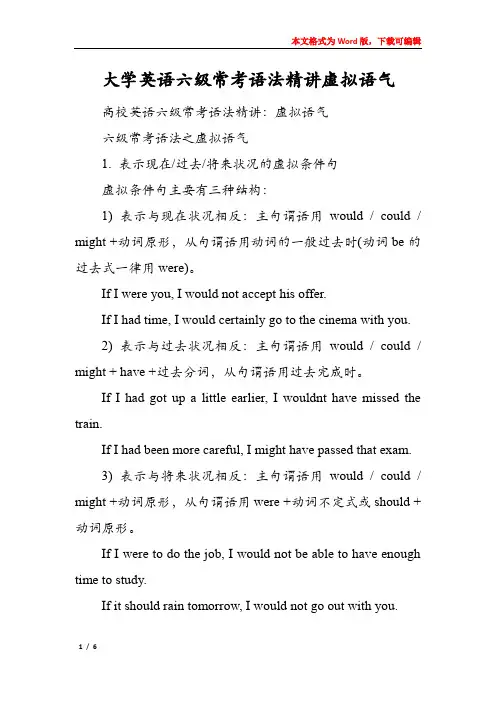
大学英语六级常考语法精讲虚拟语气高校英语六级常考语法精讲:虚拟语气六级常考语法之虚拟语气1. 表示现在/过去/将来状况的虚拟条件句虚拟条件句主要有三种结构:1) 表示与现在状况相反:主句谓语用would / could / might +动词原形,从句谓语用动词的一般过去时(动词be的过去式一律用were)。
If I were you, I would not accept his offer.If I had time, I would certainly go to the cinema with you.2) 表示与过去状况相反:主句谓语用would / could / might + have +过去分词,从句谓语用过去完成时。
If I had got up a little earlier, I wouldnt have missed the train.If I had been more careful, I might have passed that exam.3) 表示与将来状况相反:主句谓语用would / could / might +动词原形,从句谓语用were +动词不定式或should +动词原形。
If I were to do the job, I would not be able to have enough time to study.If it should rain tomorrow, I would not go out with you.2. 虚拟条件句连接词if的省略假如虚拟条件句的从句中含有were, had, should, could 等词时,可以省略连接词if,但这时必需把were, had, should, could等词移到主语前面,形成倒装。
这种句型主要用于书面形式。
Were I to do the job, I would finish doing it within two weeks.Had it not been for his help, we couldnt have arrived there on time.Should it rain tomorrow, I would stay at home.3. wish后宾语从句中的谓语构成动词wish后的宾语从句表示未实现的或不行能实现的愿望,其宾语从句中的谓语动词要用虚拟语气,有以下三种构成形式。
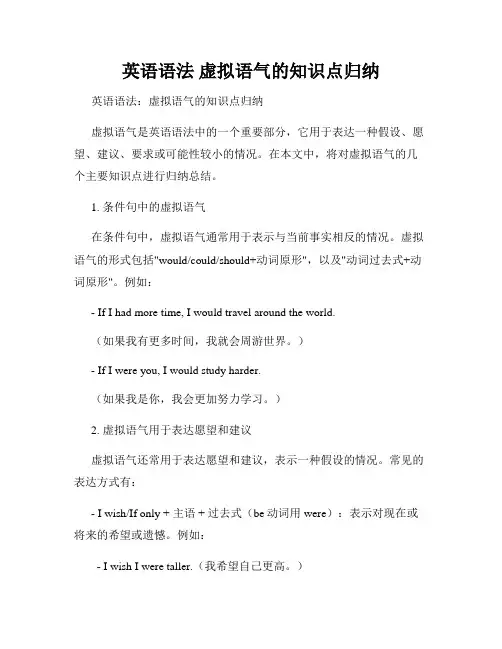
英语语法虚拟语气的知识点归纳英语语法:虚拟语气的知识点归纳虚拟语气是英语语法中的一个重要部分,它用于表达一种假设、愿望、建议、要求或可能性较小的情况。
在本文中,将对虚拟语气的几个主要知识点进行归纳总结。
1. 条件句中的虚拟语气在条件句中,虚拟语气通常用于表示与当前事实相反的情况。
虚拟语气的形式包括"would/could/should+动词原形",以及"动词过去式+动词原形"。
例如:- If I had more time, I would travel around the world.(如果我有更多时间,我就会周游世界。
)- If I were you, I would study harder.(如果我是你,我会更加努力学习。
)2. 虚拟语气用于表达愿望和建议虚拟语气还常用于表达愿望和建议,表示一种假设的情况。
常见的表达方式有:- I wish/If only + 主语 + 过去式(be动词用were):表示对现在或将来的希望或遗憾。
例如:- I wish I were taller.(我希望自己更高。
)- If only she could speak fluent English.(要是她能说一口流利的英语就好了。
)- It is time + 主语 + 过去式(should + 动词原形):用于表示现在或将来应该发生的动作。
例如:- It is time we started the meeting.(是时候开始会议了。
)- It is time you should apologize to her.(你应该向她道歉了。
)3. 虚拟语气在宾语从句中的使用在宾语从句中,若主句的动词表达了建议、命令、要求等含义时,宾语从句中的谓语动词常使用虚拟语气。
具体的用法如下:- 建议:suggest/recommend + (that) + 主语 + (should)+ 动词原形。
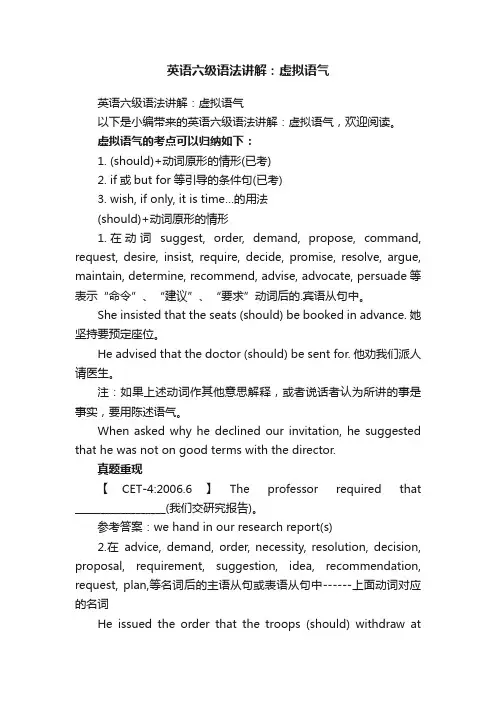
英语六级语法讲解:虚拟语气英语六级语法讲解:虚拟语气以下是小编带来的英语六级语法讲解:虚拟语气,欢迎阅读。
虚拟语气的考点可以归纳如下:1. (should)+动词原形的情形(已考)2. if或but for等引导的条件句(已考)3. wish, if only, it is time…的用法(should)+动词原形的情形1.在动词suggest, order, demand, propose, command, request, desire, insist, require, decide, promise, resolve, argue, maintain, determine, recommend, advise, advocate, persuade等表示“命令”、“建议”、“要求”动词后的.宾语从句中。
She insisted that the seats (should) be booked in advance. 她坚持要预定座位。
He advised that the doctor (should) be sent for. 他劝我们派人请医生。
注:如果上述动词作其他意思解释,或者说话者认为所讲的事是事实,要用陈述语气。
When asked why he declined our invitation, he suggested that he was not on good terms with the director.真题重现【CET-4:2006.6】The professor required that __________________(我们交研究报告)。
参考答案:we hand in our research report(s)2.在advice, demand, order, necessity, resolution, decision, proposal, requirement, suggestion, idea, recommendation, request, plan,等名词后的主语从句或表语从句中------上面动词对应的名词He issued the order that the troops (should) withdraw atonce. 他命令部队马上撤退。
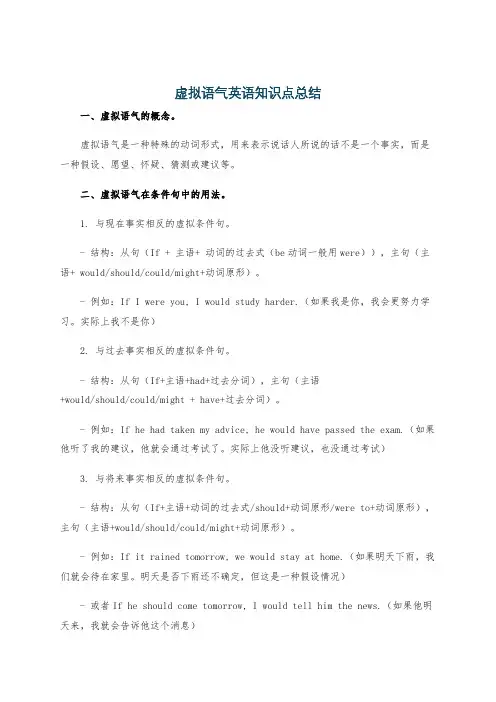
虚拟语气英语知识点总结一、虚拟语气的概念。
虚拟语气是一种特殊的动词形式,用来表示说话人所说的话不是一个事实,而是一种假设、愿望、怀疑、猜测或建议等。
二、虚拟语气在条件句中的用法。
1. 与现在事实相反的虚拟条件句。
- 结构:从句(If + 主语+ 动词的过去式(be动词一般用were)),主句(主语+ would/should/could/might+动词原形)。
- 例如:If I were you, I would study harder.(如果我是你,我会更努力学习。
实际上我不是你)2. 与过去事实相反的虚拟条件句。
- 结构:从句(If+主语+had+过去分词),主句(主语+would/should/could/might + have+过去分词)。
- 例如:If he had taken my advice, he would have passed the exam.(如果他听了我的建议,他就会通过考试了。
实际上他没听建议,也没通过考试)3. 与将来事实相反的虚拟条件句。
- 结构:从句(If+主语+动词的过去式/should+动词原形/were to+动词原形),主句(主语+would/should/could/might+动词原形)。
- 例如:If it rained tomorrow, we would stay at home.(如果明天下雨,我们就会待在家里。
明天是否下雨还不确定,但这是一种假设情况)- 或者If he should come tomorrow, I would tell him the news.(如果他明天来,我就会告诉他这个消息)- 以及If I were to see her tomorrow, I would give her the book.(如果我明天见到她,我就会把书给她)三、虚拟语气在宾语从句中的用法。
1. wish后的宾语从句。
- 表示与现在事实相反的愿望,从句谓语动词用过去式(be动词用were)。
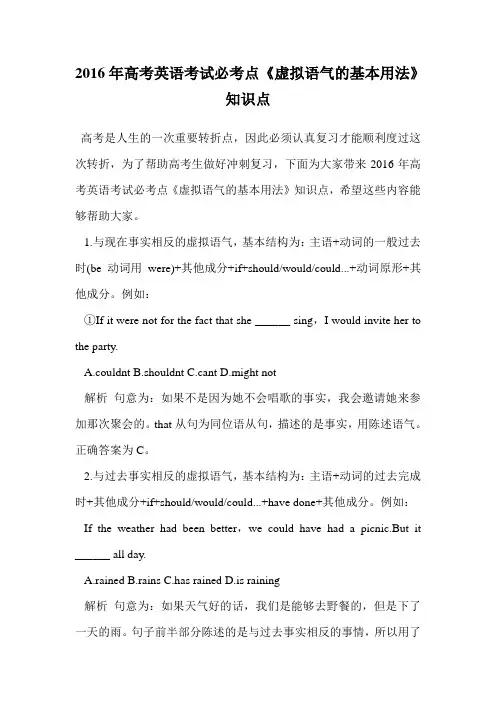
2016年高考英语考试必考点《虚拟语气的基本用法》知识点高考是人生的一次重要转折点,因此必须认真复习才能顺利度过这次转折,为了帮助高考生做好冲刺复习,下面为大家带来2016年高考英语考试必考点《虚拟语气的基本用法》知识点,希望这些内容能够帮助大家。
1.与现在事实相反的虚拟语气,基本结构为:主语+动词的一般过去时(be动词用were)+其他成分+if+should/would/could...+动词原形+其他成分。
例如:①If it were not for the fact that she ______ sing,I would invite her to the party.A.couldntB.shouldntC.cantD.might not解析句意为:如果不是因为她不会唱歌的事实,我会邀请她来参加那次聚会的。
that从句为同位语从句,描述的是事实,用陈述语气。
正确答案为C。
2.与过去事实相反的虚拟语气,基本结构为:主语+动词的过去完成时+其他成分+if+should/would/could...+have done+其他成分。
例如:If the weather had been better,we could have had a picnic.But it ______ all day.A.rainedB.rainsC.has rainedD.is raining解析句意为:如果天气好的话,我们是能够去野餐的,但是下了一天的雨。
句子前半部分陈述的是与过去事实相反的事情,所以用了虚拟语气。
下了一天的雨是事实,所以用陈述语气。
因为是发生在过去的事实,所以正确答案为A。
3.与将来事实相反的虚拟语气,基本结构为:主语+动词的一般过去时/should do/were to do+其他成分+if+should/would/could...+动词原形+其他成分。
例如:If I ______ plan to do anything I want to,Id like to go to Tibet and travel through as much of it as possible.A.wouldB.couldC.had toD.ought to解析句意为:如果我能够计划做我想做的事情,我想去西藏并且尽可能多玩一些地方。
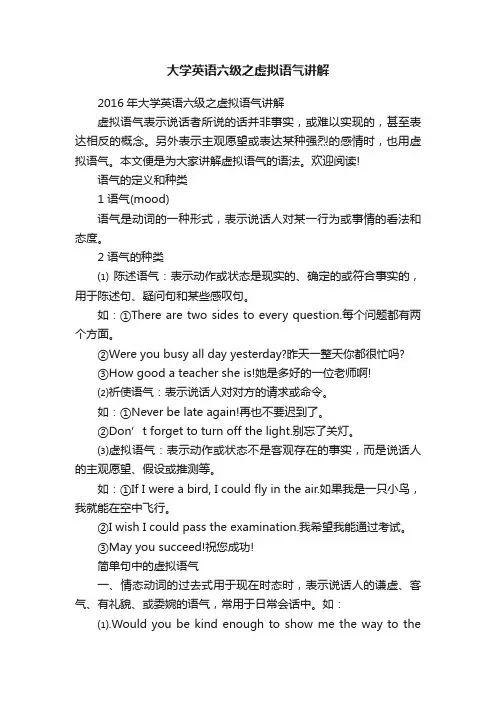
大学英语六级之虚拟语气讲解2016年大学英语六级之虚拟语气讲解虚拟语气表示说话者所说的话并非事实,或难以实现的,甚至表达相反的概念。
另外表示主观愿望或表达某种强烈的感情时,也用虚拟语气。
本文便是为大家讲解虚拟语气的语法。
欢迎阅读!语气的定义和种类1 语气(mood)语气是动词的一种形式,表示说话人对某一行为或事情的看法和态度。
2 语气的种类⑴ 陈述语气:表示动作或状态是现实的、确定的或符合事实的,用于陈述句、疑问句和某些感叹句。
如:①There are two sides to every question.每个问题都有两个方面。
②Were you busy all day yesterday?昨天一整天你都很忙吗?③How good a teacher she is!她是多好的一位老师啊!⑵祈使语气:表示说话人对对方的请求或命令。
如:①Never be late again!再也不要迟到了。
②Don’t forget to turn off the light.别忘了关灯。
⑶虚拟语气:表示动作或状态不是客观存在的事实,而是说话人的主观愿望、假设或推测等。
如:①If I were a bird, I could fly in the air.如果我是一只小鸟,我就能在空中飞行。
②I wish I could pass the examination.我希望我能通过考试。
③May you succeed!祝您成功!简单句中的虚拟语气一、情态动词的过去式用于现在时态时,表示说话人的谦虚、客气、有礼貌、或委婉的语气,常用于日常会话中。
如:⑴.Would you be kind enough to show me the way to thepost office?请你告诉我去邮局的路好吗?⑵.It would be better for you not to stay up too late.你最好别熬夜到很晚。
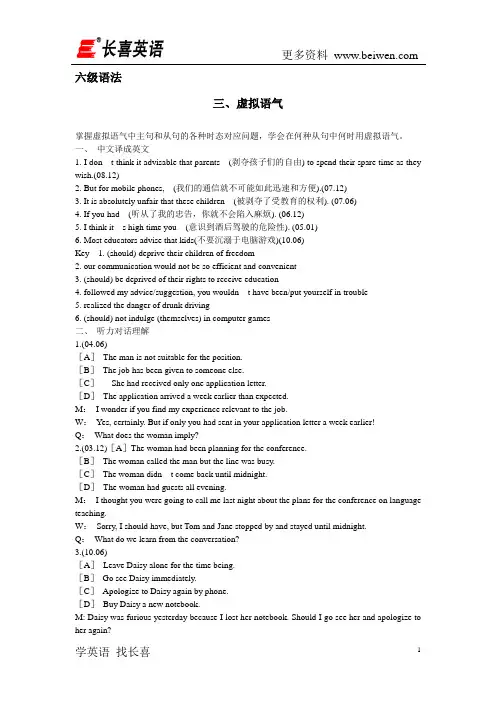
六级语法三、虚拟语气掌握虚拟语气中主句和从句的各种时态对应问题,学会在何种从句中何时用虚拟语气。
一、中文译成英文1. I don t think it advisable that parents (剥夺孩子们的自由) to spend their spare time as they wish.(08.12)2. But for mobile phones, (我们的通信就不可能如此迅速和方便).(07.12)3. It is absolutely unfair that these children (被剥夺了受教育的权利). (07.06)4. If you had (听从了我的忠告,你就不会陷入麻烦). (06.12)5. I think it s high time you (意识到酒后驾驶的危险性). (05.01)6. Most educators advise that kids(不要沉溺于电脑游戏)(10.06)Key 1. (should) deprive their children of freedom2. our communication would not be so efficient and convenient3. (should) be deprived of their rights to receive education4. followed my advice/suggestion, you wouldn t have been/put yourself in trouble5. realized the danger of drunk driving6. (should) not indulge (themselves) in computer games二、听力对话理解1.(04.06)[A]The man is not suitable for the position.[B]The job has been given to someone else.[C]She had received only one application letter.[D]The application arrived a week earlier than expected.M:I wonder if you find my experience relevant to the job.W:Yes, certainly. But if only you had sent in your application letter a week earlier!Q:What does the woman imply?2.(03.12)[A]The woman had been planning for the conference.[B]The woman called the man but the line was busy.[C]The woman didn t come back until midnight.[D]The woman had guests all evening.M:I thought you were going to call me last night about the plans for the conference on language teaching.W:Sorry, I should have, but Tom and Jane stopped by and stayed until midnight.Q:What do we learn from the conversation?3.(10.06)[A]Leave Daisy alone for the time being.[B]Go see Daisy immediately.[C]Apologize to Daisy again by phone.[D]Buy Daisy a new notebook.M: Daisy was furious yesterday because I lost her notebook. Should I go see her and apologize to her again?W: Well, if I were you, I d let her cool off a few days before I approach her.Q: What does the woman suggest the man do?4.(03.06)[A]She suggested a way out of the difficulty for the man.[B]She took the man to where he wanted to go.[C]She came a long way to meet the man.[D]She promised to help the man.M:Thank you for your helpful assistance. Otherwise, I d surely have missed it. The place is so out of the way.W:It was a pleasure meeting you. Good bye!Q:Why did the man thank the woman?Key 1. 【分析】选[B]。
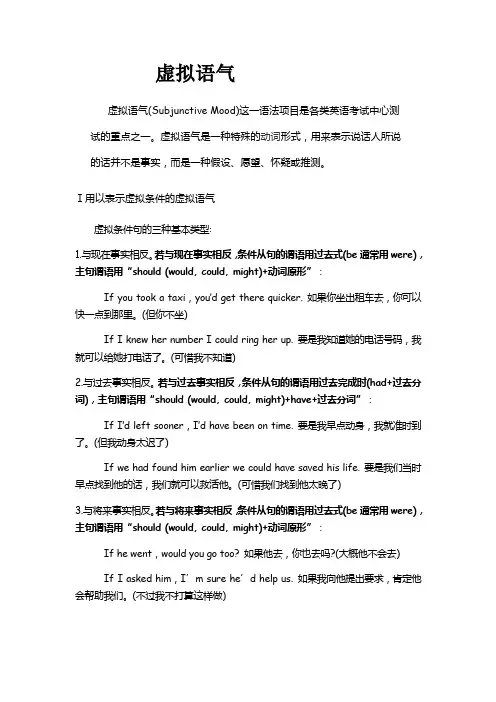
虚拟语气虚拟语气(Subjunctive Mood)这一语法项目是各类英语考试中心测试的重点之一。
虚拟语气是一种特殊的动词形式,用来表示说话人所说的话并不是事实,而是一种假设、愿望、怀疑或推测。
Ⅰ用以表示虚拟条件的虚拟语气虚拟条件句的三种基本类型:1.与现在事实相反。
若与现在事实相反,条件从句的谓语用过去式(be通常用were),主句谓语用“should (would, could, might)+动词原形”:If you took a taxi,you’d get there quicker.如果你坐出租车去,你可以快一点到那里。
(但你不坐)If I knew her number I could ring her up. 要是我知道她的电话号码,我就可以给她打电话了。
(可惜我不知道)2.与过去事实相反。
若与过去事实相反,条件从句的谓语用过去完成时(had+过去分词),主句谓语用“should (would, could, might)+have+过去分词”:If I’d left sooner,I’d have been on time.要是我早点动身,我就准时到了。
(但我动身太迟了)If we had found him earlier we could have saved his life. 要是我们当时早点找到他的话,我们就可以救活他。
(可惜我们找到他太晚了)3.与将来事实相反。
若与将来事实相反,条件从句的谓语用过去式(be通常用were),主句谓语用“should (would, could, might)+动词原形”:If he went,would you go too? 如果他去,你也去吗?(大概他不会去)If I asked him,I’m sure he’d help us. 如果我向他提出要求,肯定他会帮助我们。
(不过我不打算这样做)大多数的虚拟条件句属于上面三种情况的一种,但并不排除存在条件和后果中,一个和现在情况相反,另一个和过去情况相反,例如:If you had followed what the doctor said, you would not have been so painful now.这个句子在高中出现频率颇高。
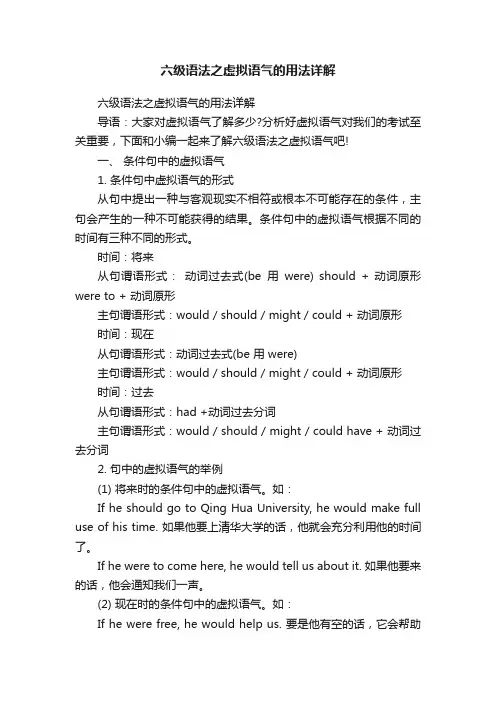
六级语法之虚拟语气的用法详解六级语法之虚拟语气的用法详解导语:大家对虚拟语气了解多少?分析好虚拟语气对我们的考试至关重要,下面和小编一起来了解六级语法之虚拟语气吧!一、条件句中的虚拟语气1. 条件句中虚拟语气的形式从句中提出一种与客观现实不相符或根本不可能存在的条件,主句会产生的一种不可能获得的结果。
条件句中的虚拟语气根据不同的时间有三种不同的形式。
时间:将来从句谓语形式:动词过去式(be用were) should + 动词原形were to + 动词原形主句谓语形式:would / should / might / could + 动词原形时间:现在从句谓语形式:动词过去式(be 用 were)主句谓语形式:would / should / might / could + 动词原形时间:过去从句谓语形式:had +动词过去分词主句谓语形式:would / should / might / could have + 动词过去分词2. 句中的虚拟语气的举例(1) 将来时的条件句中的虚拟语气。
如:If he should go to Qing Hua University, he would make full use of his time. 如果他要上清华大学的话,他就会充分利用他的时间了。
If he were to come here, he would tell us about it. 如果他要来的话,他会通知我们一声。
(2) 现在时的条件句中的虚拟语气。
如:If he were free, he would help us. 要是他有空的话,它会帮助我们的。
If he studied at this school, he would know you well. 如果他在这所学校学习的话,它会对你很熟悉。
(3) 过去时的条件句中的虚拟语气。
如:If I had seen the film, I would have told you about it. 我如果看过这场电影,我会把电影内容告诉你了。
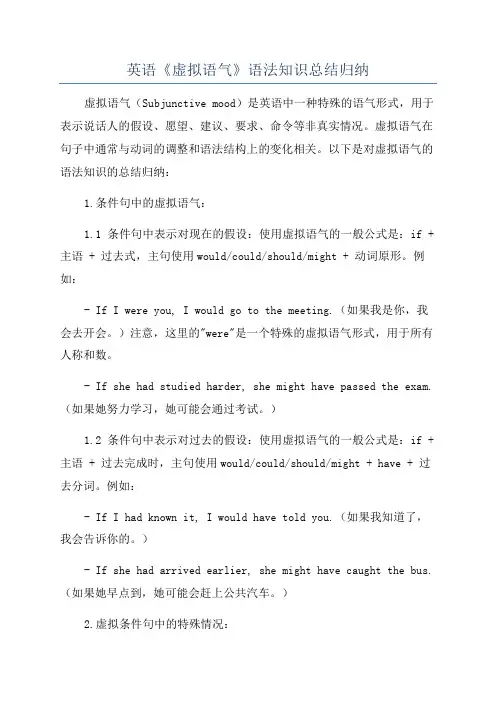
英语《虚拟语气》语法知识总结归纳虚拟语气(Subjunctive mood)是英语中一种特殊的语气形式,用于表示说话人的假设、愿望、建议、要求、命令等非真实情况。
虚拟语气在句子中通常与动词的调整和语法结构上的变化相关。
以下是对虚拟语气的语法知识的总结归纳:1.条件句中的虚拟语气:1.1 条件句中表示对现在的假设:使用虚拟语气的一般公式是:if + 主语 + 过去式,主句使用would/could/should/might + 动词原形。
例如:- If I were you, I would go to the meeting.(如果我是你,我会去开会。
)注意,这里的"were"是一个特殊的虚拟语气形式,用于所有人称和数。
- If she had studied harder, she might have passed the exam.(如果她努力学习,她可能会通过考试。
)1.2 条件句中表示对过去的假设:使用虚拟语气的一般公式是:if + 主语 + 过去完成时,主句使用would/could/should/might + have + 过去分词。
例如:- If I had known it, I would have told you.(如果我知道了,我会告诉你的。
)- If she had arrived earlier, she might have caught the bus.(如果她早点到,她可能会赶上公共汽车。
)2.虚拟条件句中的特殊情况:2.1 在虚拟条件句中表示命令、建议时,主句中的动词可以使用动词原形(而不是would/could/should/might + 动词原形)。
例如:- If you have any questions, please let me know.(如果你有任何问题,请告诉我。
)- If I were you, I would take a break.(如果我是你,我会休息一下。
虚拟语气(精华)虚拟语气是一种特殊的语法现象,它表达的是一种假设、愿望、建议、请求等非现实的情况。
在英语中,虚拟语气常常用于表示与现实相反的情况,或者表示对未来的期望。
虚拟语气的使用可以使语言更加生动、丰富,更具有表现力。
虚拟语气的基本形式包括三种:现在虚拟、过去虚拟和将来虚拟。
现在虚拟表示与现实相反的情况,过去虚拟表示与过去事实相反的情况,将来虚拟表示对未来的期望或假设。
例如,现在虚拟可以用来表示一种不可能实现的情况,如:“IfI were a bird, I could fly.”(如果我是只鸟,我就能飞。
)这里的“如果我是只鸟”就是一个与现实相反的假设,因此需要使用虚拟语气。
将来虚拟则用来表示对未来的期望或假设,如:“If I pass the exam, I will go to college.”(如果我能通过考试,我就会上大学。
)这里的“如果我能通过考试”是一个对未来的期望,因此需要使用虚拟语气。
虚拟语气在英语中的使用非常广泛,掌握虚拟语气的用法对于提高英语水平,丰富语言表达具有重要作用。
通过学习虚拟语气,我们可以更好地理解和运用英语,使我们的语言更加生动、丰富,更具有表现力。
虚拟语气(精华)在英语的学习过程中,虚拟语气是一个较为复杂且重要的语法点。
它不仅用于表达非现实的情况,还常常用于表达委婉的建议、请求或命令。
虚拟语气通过特定的动词形式和助动词的使用,使得句子具有一种特殊的语气,从而传达出特定的情感或态度。
在商务英语中,虚拟语气常用于提出建议或请求,以避免过于直接或强硬的表达。
例如:“It is important that the report be submitted the end of the week.”(报告必须在周末前提交,这是很重要的。
)这里的“be submitted”是虚拟语气的形式,用来表达一种要求或建议。
在文学作品或日常对话中,虚拟语气也常用于表达愿望或遗憾。
英语的动词一般可带有三种不同的语气:陈述语气,祈使语气和虚拟语气。
虚拟语气是一种特殊的动词形式:一是用来表示说话人所说的话不是一个事实,而是一种假设、猜测、怀疑等(在条件从句中或让步状语从句中);二是表示说话人的愿望、要求、命令、建议等(在宾语从句、表语从句、同位语从句)。
一、虚拟语气在条件句中虚拟条件句主句与现在事实相反的假设If+主语+动词的过去式(动词be用were)主语+should,would,might,could+动词原形与过去相反的假设If+主语+had +过去分词主语+should, would, might,could+have done与将来相反的假设1、If+主语+动词过去式2、If+主语+were to+ 动词原形3、If+主语+should +动词原形主语+should, would,might,could+动词原形eg: If I had time, I would attend the meeting.If he had hurried ,he could have caught the train.If I were to go abroad ,I would go to America.注意:使用虚拟条件句要注意的几点:当条件状语从句表示的行为和主句表示的行为所发生的时间不一致时,被称为:错综时间条件句“,动词的形式要根据它所表示的时间作出相应的调整1、If you had followed my advice , you would be better now.如果你听我的建议,你现在就会痊愈了.2、If you had studied hard before, you would be a college student now.如果你努力学习的话,你现在就会是大学生了.错综时间条件句例题:Had you listened to the doctor, you _____ all right now.A.areB. wereC. would beD. would have been 解析:这是个混合型的虚拟语气,前面是个省略加倒装句,还原后是 If you had listen to the doctor, you would be all right now. 如果你当初听医生的话,现在病都好了。
虚拟语气一、考点聚焦1、虚拟语气用于条件状语从句中(1)表示与现在事实相反的假设,条件状语从句中的谓语动词用“过去式(be动词的过去式用were)”,而主句中的谓语动词用“would / should/ could / might + 动词原形”。
如:If I were a boy, I would join the army.If the had time, she should go with you.(2)表示与过去的事实相反,条件状语从句中的谓语动词用过去完成时,主句中的谓语动词则用“would / should / might / could + have +过去分词”。
如:If he had taken my advice, he would have succeeded in the competition.(3)表示与将来事实相反,条件状语从句中的谓语动词一般过去时或should(were to) + 动词原形,而主句中的谓语动词则用would / should/could might + 动词原形。
如;If it were to rain tomorrow, the football match would be put off.(4)当条件状语从句表示的行为和主句表示的行为所发生的时间不一致时,动词的形式要根据它所表示的时间作相应调整。
如:If they had worked hard, they would be very tired.(从句说的是过去,主句指的是现在)Were I a boy, I would join the army.Had he taken my advice, he would have succeeded.Were it not for the expense, I would go to Britain.2、虚拟语气用于名词性从句(1)虚拟语气在宾语从句中的运用。
虚拟语气知识点总结
1、虚拟语气
虚拟语气是指一种表示假设或愿望的语法结构,它把一个不可能发生或不真实的情景描绘成一种可能性或假如的句子。
它的主要用途是表达某种假想或期望。
2、虚拟语气的形式
虚拟语气有三种形式:(1) should + 动词原形; (2) were + 动词原形; (3) had + 过去分词。
3、虚拟语气的用法
(1) should + 动词原形:表示某种一般的假设或期望,例如:If I had money, I should buy a car.
(2) were + 动词原形:表示与现在事实相反的假设,例如:If I were you, I wouldn't do that.
(3) had + 过去分词:表示与过去事实相反的假设,例如:If I had studied hard, I wouldn't have failed the exam.
4、虚拟语气与实际语气的区别
(1) 语序不同:实际语气是实意句,主谓宾语序;虚拟语气为条件句,句首常有if等连词,主谓的语序通常由主语部分在句首构成条件状语。
(2) 谓语动词形式不同:实际语气谓语动词用一般时,虚拟语气谓语动词用虚拟语气形式。
(3) 意义不同:实际语气表示真实发生的事实,虚拟语气表示假
设或期望。
1. As usual, he put on a show as though his trip______ a great success.A. had beenB. has beenC. wereD. was 解析:A.as though引导的与过去相反的虚拟。
2. Looking round the town, he felt as though he ______ away for ages.A. has beenB. wasC. isD. had been 解析:D.felt是过去式,所以该句是由as though引导的与过去相反的虚拟。
3. John is so strongly built that he looks as if he ______ as elephant.A. liftsB. is liftingC. liftedD. could lift 解析:D.as if引导的与现在事实相反的虚拟。
4. He described the town as if he ______ it himself.A. had seenB. has seenC. sawD. sees 解析:A.as if引导的与过去相反的虚拟。
5. Most insurance agents would rather you______ anything about collecting claims until they investigate the situation.A. doB. don’tC. didn’tD. didn’t do 解析:(D)would rather后接从句要求⽤虚拟语⽓,形式为过去式,表⽰对现在或将来的假设,或为过去完成式表⽰对过去的情况的假设。
6. Although most adopted persons want the right to know who their natural parents are, some who have found them wish that they ______ the experience of meeting.A. hadn’tB. didn’t have hadC. hadn’t hadD. hadn’t have 解析:(C)who引导的定语从句中的现在完成时表⽰动作业已发⽣,所以主句中表⽰的虚拟是针对已经发⽣了的⾏为,所以应该⽤过去完成式表⽰对过去的虚拟。
2016英语六级语法复习:虚拟语气2016英语六级语法复习:虚拟语气1.主从句谓语动词的时态?(1)掌握主从句谓语动词的规范搭配:?如:If the doctor had been available, the child could not have died.?There is a real possibility that these animals could be frightened, should there bea sudden loud noise.?(2)区分主从句表示的不同时间概念:?主从句谓语动词所指时间不同,这叫做错综时间条件句,动词形式应根据实际情况来调整。
如:?Had it not been for the timely investment from the general public, our company would not be so thriving as it is.?(主句与现在事实相反,从句与过去事实相反)?Had Paul received six more votes in the last election, he would be our chairman now.? (主句与现在事实相反,从句与过去事实相反)?(3)识别事实和假设混合句:?Your math instructor would have been happy to give you a make-up examination had you gone and explained that your parents were ill at the time. (句子前半部分为假设情况,而“父母病了”是事实) I would have gone to visit him in the hospital had it been at all possible, but I was fully occupied the whole of last week. (前半部分为假设,后半部分是事实)2.名词性从句的虚拟形式?名词性从句是指宾语从句、主语从句、表语从句和同位语从句。
从句的谓语动词需用(should+)动词原形表示虚拟。
考生应熟悉:?(1)下列动词做谓语时,that宾语从句中的动词用虚拟形式:?desire, advise, recommend, command, direct, order, ask, demand, request, require, insist, maintain, move, propose, prefer, urge, vote。
如:?In the past men generally preferred that their wives work in the home. I move that he be discharged for his serious mistake.?(2)下列形容词和分词做表语或补语时,that主语从句中动词用虚拟形式:?advisable, desirable, insistent, preferable, urgent, appropriate, compulsory, crucial, essential, imperative, important, necessary, obligatory, possible, probable, proper, vital, advised, arranged, commanded, demanded, desired, ordered, proposed, recommended, requested, required, suggested。
如: The board deem it urgent that these files should be printed right away. It is essential that all these figures be checked twice.?(3)下列名词接同位语从句或表语从句时,从句中动词用虚拟形式:?insistence, preference, recommendation, suggestion, proposal, motion, desire, requirement, request, order, necessity, importance, regulation, rule, resolution, understanding。
如:?John Wagner’s most enduring contribution to the study of Afro-American poetry is his insistence that it be analyzed in a religious, as well as worldly, frame of reference.?They keep telling us it is of utmost importance that our representative be sent tothe conference on schedule.3.含蓄虚拟条件句的谓语动词形式?含蓄虚拟语气是指假设条件不通过if从句表达,而是暗含在其他结构中。
考生应熟悉:? (1)连词but, but that, or, or else;副词otherwise, unfortunately等表示转折假设。
如:?A safety analysis would have identified the target as a potential danger. Unfortunately, it was never done. Victor obviously doesn’t know what’s happened; otherwise he wouldn’t have made such a stupid remark.?(2)介词短语暗含假设条件,常用的有:without, but for, under more favorable conditions 等。
如:?But for the English examination I would have gone to the concert last Sunday.? (3)intended/meant/hoped/wished/plann或was/were +不定式完成式或had intended/meant/planned/hoped/wished +不定式一般式暗示虚拟语气。
如:?I intended to have called on you, but I was busy at that time.?(4)情态动词完成式暗示虚拟语气。
如:?I should have called to make an airline reservation, but I didn’t.4.常用虚拟形式的句型?(1)从句中动词用过去式或过去完成式表示虚拟的句型:?would rather would as soon as though suppose…had rather would sooner as if supposing… If only… It is (high) time that…(从句中动词只用过去式) 如:?His wife would rather they didn’t talk about the matter any more.?If I were in a movie, then it would be about time that I buried my head in my hands for a cry.?(2)If it were not for… (与现在事实相反)、If it had not been for… (与过去事实相反) 相当于but for。
如:?If it had not been for his help (= but for his help), we would not have succeeded.?(3)If only…谓语动词视情况选用适当的形式。
如:?If only the committee would approve the regulations and put them into effect as soon as possible.?(4)lest/for fear that/in case 从句谓语用(should+)动词原形。
如:?The mad man was put in the soft-padded cell lest he injure himself.?(5)whether…or…有时谓语用be的原形,引导让步虚拟从句,这种用法经常采用倒装结构。
如:?Church as we use the word refers to all religious institutions, be they Christian, Islamic, Buddhist, Jewish, and so on.* 作文预测:CET6作文预测* 作文模板:CET6万能模板* CET6考试:CET6考试时间* 成绩查询:CET6成绩查询* CET6真题:CET6考试真题* CET6答案:CET6考试答案点击免费试听>>> 点击免费试听>>>备注说明,非正文,实际使用可删除如下部分。
本内容仅给予阅读编辑指点:1、本文件由微软OFFICE办公软件编辑而成,同时支持WPS。
2、文件可重新编辑整理。
3、建议结合本公司和个人的实际情况进行修正编辑。
4、因编辑原因,部分文件文字有些微错误的,请自行修正,并不影响本文阅读。
Note: it is not the text. The following parts can be deleted for actual use. This content only gives reading and editing instructions:1. This document is edited by Microsoft office office software and supports WPS.2. The files can be edited and reorganized.3. It is suggested to revise and edit according to the actual situation of the company and individuals.4. Due to editing reasons, some minor errors in the text of some documents should be corrected by yourself, which does not affect the reading of this article.。